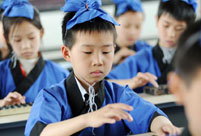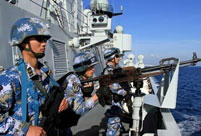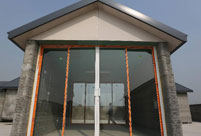 Versatile dog
Versatile dog
 Ni Ni covers BAZAAR JEWELRY
Ni Ni covers BAZAAR JEWELRY
 Cherry blossoms reach peak bloom in Washington D.C.
Cherry blossoms reach peak bloom in Washington D.C.
 Top Chinese fashion icons in foreigners' eyes
Top Chinese fashion icons in foreigners' eyes
 Asia's largest business aviation exhibition to be held in Shanghai
Asia's largest business aviation exhibition to be held in Shanghai
 World's top-rated luxury hotels
World's top-rated luxury hotels
 Wu Jing, Xie Nan to hold wedding on May
Wu Jing, Xie Nan to hold wedding on May
 London Cake International attracts tourists
London Cake International attracts tourists
 Let's dance in harmonic Shaanxi
Let's dance in harmonic Shaanxi
 Christie's to auction dazzling diamonds
Christie's to auction dazzling diamonds
Q: The Geneva meeting held by Russia, the US, the EU and Ukraine on the situation in Ukraine released a joint statement, agreeing on initial concrete steps to de-escalate tensions and restore security for all citizens. It also states that all sides must refrain from any violence, intimidation or provocative actions. What is China's comment?
A: China maintains that the Ukrainian crisis should be politically resolved and pays equal attention to all parties' interests. China welcomes the meeting held by Russia, the US, the EU and Ukraine and their agreement on de-escalating tensions in Ukraine. We hope that all parties will make concerted efforts, take concrete measures and put relevant agreement into practice so as to solve the crisis politically and realize stability and development of Ukraine at an early date.
Q: Two more Chinese citizens are said to be among the missing passengers of the ROK ferry "Sewol". Please confirm that. What has the Chinese side done so far?
A: After checking with the ROK coast guard, the Chinese Embassy in the ROK and the Chinese Consulate General in Gwangju corroborated that there were two more Chinese citizens aboard the ship and one of them was a student. The information we have got up till now shows that altogether four Chinese citizens are among the missing passengers.
The Chinese Foreign Ministry, the Chinese Embassy in the ROK and the Consulate General in Gwangju are in close communication with relevant departments of the ROK, asking them to make all-out efforts for search and rescue, find out the whereabouts of the Chinese citizens as soon as possible, check and verify the passenger list and provide us with information about the Chinese passengers in a timely fashion. Personnel of the Consulate General in Gwangju are already on the scene, consoling families of the Chinese passengers.
Q: Japanese Prime Minister Shinzo Abe said yesterday that China is challenging the status quo with force in the East China Sea and South China Sea, and it is necessary for not only Japan but also the international community to prompt China to grow peacefully as a responsible country. What is China's comment?
A: China has made clear its principled position on issues of the East China Sea and the South China Sea. When looking back at the evolution of relevant issues, you will find that both the historical facts and merits of these issues are crystal-clear. It is not China who takes provocative actions and changes the status quo. The Chinese side has the firm resolve and strong will to safeguard national sovereignty and territorial integrity. Bearing in mind regional peace and stability, we always exercise restraint and stay committed to properly managing and resolving relevant disputes through dialogue and consultation.
The Japanese leader has been making erroneous remarks with two obvious purposes. The first is to divert people's attention, mislead public opinion and cover up Japan's perverse actions on historical issues. The second is to draw in a third party to contain China's growth. The tricks of calling white black and self-deceiving will fool no one, nor will they daunt China. All these are made to no avail and are doomed to fail.
Last but not least, in face of the irrefutable evidence that lays bare the crime of invasion committed by the Japanese militarism, the Japanese leader shows no repentance and refuses to face up to and properly deal with historical issues. Is he in any position to tell China how to be responsible?
Q: US President Barack Obama will visit Asia next week. How does China view this visit?
A: I'd point you to the US and countries concerned for details of the visit.
With regard to the Asia Pacific, what China cares most are regional peace, stability, economic growth as well as peaceful coexistence and win-win cooperation between countries in the region. China will, as always, make unremitting efforts toward that end together with other countries in the region. We hope that all countries can play a constructive role for the realization of the aforementioned goal.
Q: It is reported that the Japanese government is planning to deploy a Ground Self Defense Force unit on Yonaguni, an island located 150 kilometers away from the Diaoyu Islands at the western tip of Japan's territorial waters, with the aim of strengthening the surveillance over the southwestern region. What is China's comment?
A: Due to historical reasons, any of Japan's military moves will raise concern among Asian countries. Japan has been hyping up regional threat and accelerating military buildup over the recent period of time. Japan should give a serious explanation for its real intention of building military muscle in relevant region. We hope that the Japanese side can learn lessons from history, adhere to the path of peaceful development, respect and take seriously the legitimate security concerns of its Asian neighbors and do more to promote mutual trust with its neighbors and safeguard regional peace and stability.
Q: First, whom will Foreign Minister Wang Yi meet with during his visit to Latin America? Second, the Nobel Laureate of Literature in 1982, Columbian writer Gabriel Garcia Marquez passed away in Mexico City, Mexico on the morning of April 18. Does China have any comment on that?
A: On your first question, Foreign Minister Wang Yi will set off to pay official visits to Cuba, Venezuela, Argentina and Brazil. From April 19 to 20, Foreign Minister Wang will visit Cuba, where he will meet with Raúl Castro, President of Council of State and President of Council of Ministers, and hold talks with Foreign Minister Bruno Rodríguez. From April 21 to 22, Foreign Minister Wang will visit Venezuela, where he will meet with President Nicolás Maduro Moros and hold talks with Foreign Minister Elías Jaua. From April 23 to 24, Foreign Minister Wang will visit Argentina, where he will meet with President Cristina Fernández de Kirchner and hold talks with Minister of Foreign Affairs and Worship Héctor Timerman. From April 25 to 26, Foreign Minister Wang will visit Brazil, where he will meet with President Dilma Rousseff and hold the first China-Brazil comprehensive strategic dialogue at foreign-minister level with Foreign Minister Luiz Figueiredo Machado.
Over the past few years, relations between China and Latin America have made substantial progress. China is willing to push forward China-Latin America relations. Foreign Minister Wang Yi's visit aims to further enhance high-level interactions between China and countries to be visited, promote practical cooperation in various fields and reinforce exchanges and cooperation between foreign ministries of China and these four countries. We look forward to positive outcome of this visit.
On your second question, being one of the greatest writers of the 20th century, Mr. Marquez has left behind a huge legacy of literature shared by all human beings. He is also fervently followed by Chinese readers. We mourn for the passing away of Mr. Marquez and extend sympathies to his families.
Q: Russian President Vladimir Putin said in a televised call-in on Wednesday that relations between Russia and China have developed to an all-time high and they will play a significant role on the global political stage. What is China's comment? President Putin also talked with the press about his upcoming visit to China in May after the televised call-in. What is China's expectation for the visit?
A: We have noted and we commend the positive remarks made by President Putin on China-Russia relations. Thanks to the strategic guidance by the heads of state of China and Russia, bilateral relationship has come into fruition, becoming one pair of major-country relations that boasts the richest contents, the highest level and the greatest strategic significance.
China-Russia comprehensive strategic partnership of coordination is non-alliance, non-confrontation and not targeting the third party in nature. This kind of partnership, which is mature and stable, instills vigor and vitality to the growth of China-Russia relations and sets a good example in terms of peaceful coexistence and good-neighborliness of major countries. China is ready to advance China-Russia relations at a high level together with the Russian side and make more contributions to the rejuvenation of the two countries as well as peace and stability of the region and beyond.
President Putin will pay a state visit to China when coming to attend the Conference on Interaction and Confidence Building Measures in Asia (CICA) Summit in May. The two sides are cooperating closely to prepare for the visit. China expects to further enhance the high-level political mutual trust, intensify practical cooperation and enrich the comprehensive strategic partnership of coordination through this visit, so as to constantly upgrade both the quality and performance of China-Russia comprehensive strategic partnership of coordination.
 Cherry blossoms hit peak bloom in Washington D.C.
Cherry blossoms hit peak bloom in Washington D.C. Children in ancient costumes learn Zhusuan
Children in ancient costumes learn Zhusuan Tens of thousands celebrate Water Splashing Festival
Tens of thousands celebrate Water Splashing Festival A bite of China II whets the appetite
A bite of China II whets the appetite Chinese frigate completes its 14th escort mission
Chinese frigate completes its 14th escort mission Let's dance in wealthy Shaanxi
Let's dance in wealthy Shaanxi A date with 798: feel the art around you
A date with 798: feel the art around you 3D-printed houses built in Shanghai
3D-printed houses built in Shanghai World largest scale of umbrella dance
World largest scale of umbrella dance The backstage of the Fashion Week
The backstage of the Fashion Week College students in Han costumes
College students in Han costumes Postgraduate works as waitress
Postgraduate works as waitress Life in a Lahu village in Yunnan
Life in a Lahu village in Yunnan An orphan’s wedding
An orphan’s wedding Hollywood documentary brings Diaoyu Islands truth to new audience
Hollywood documentary brings Diaoyu Islands truth to new audienceDay|Week|Month